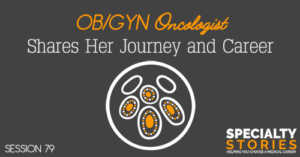Apple Podcasts | Google Podcasts

Session 79
Dr. Brittany Davidson is an academic OB/GYN Oncologist practicing at Duke Health. She joined us to share the specialty she chose and why it’s great.
Please help up find more guests for this podcast by sending an email to team@medicalschoolhq.net and write the subject: Specialty Stories Intern.
[01:40] Interest in Oncology
Brittany has always been interested in women’s health even back in college. She then followed the path to medical school, realizing she loved being in the operating room as well as the people and the OB/GYNs she worked with. She saw how they were happy at work – something she wanted to be like.
After her third year rotation as a medical student, she was pretty cemented to OB-Gyn and didn’t realize she was going to do Oncology until 2nd-year residency. Going into OB-Gyn she was thinking it was all about delivering babies and bringing joy to the world. In fact, she remembers telling her medical school tour guide that she didn’t want to do Oncology. However, after first rotation as a 2nd-resident and coming back from honeymoon and a day in the clinic, she just fell in love with patients and the operating room, taken by surprise.
'There's always something and that's the fun part is figuring out what that something is sometimes.'Click To Tweet[05:18] Traits of a Good Gynecologist
You have to be interested in being in an operating room but you also have to be great listener. By not talking and letting that patient have that time is very important. With the information you get from them, you can help potential treatment options.
'Listening is an under-recognized, underutilized field that I'm really starting to do more of myself and trying to instill that in the people that I help train.'Click To TweetIt’s hard to be quiet as silence is really awkward but that’s where sometimes the best and most information comes through. As physicians, we don’t learn enough about how to communicate as physicians but it’s a ubiquitous skill across fields.
[07:30] Types of Patients and Treatment Process
As a GYN/Oncologist, they’re referred to as oncologist below the belt. They take care of female reproductive cancers – ovarian, uterine, vulvar, vaginal, cervical cancer. They also take care of pre-cancer, the precursors to those cancers such as cervical dysplasia or vulvar dysplasia. They also get referrals for difficult or extensive benign GYN surgery like difficult endometriosis patients, although they still see some benign gynecology in their practice as well as female pelvic cancers.
Benign OB/Gyn or general OB/Gyn practitioners these days are jack of all trades as Brittany would describe it. They do a little bit of obstetrics and a bit of gynecologic surgery. But a lot of them don’t operate enough these days to feel comfortable doing some of these very difficult GYN surgeries. And a lot of times, they don’t have the volume to feel comfortable trying to do these surgeries.
In terms of patients coming to her already diagnosed versus those she still had to diagnose, she’d give it a ratio of 50-50. They get a lot of referrals for ovarian masses to help triage whether this is high suspicion of cancer or not. They also see cancers of the uterus. Unfortunately, with ovarian cancers, the vast majority of them are diagnosed with advanced disease. They have a lot of symptoms as well as anxieties or evidence of metastasis on imaging. In short, they see a little bit of everything.
[10:27] Typical Day and Percentage of Procedures
As an academic OB-Gyn oncologist, they have some research time. She starts clinic at 8 AM and sees about 30 patients, running the gamut of diagnosis. Mostly, she sees patients who are post-menopausal, though she does see some younger women too especially for uterine cancers.
'It's never a dull moment because each patient is different.'Click To TweetOn a surgical day, OR starts at 7 AM. Never a dull moment as well — she could have a whole day of cancer cases. Some days, she could have benign days. Again, it’s always something different that she truly enjoys.
As to the percentage of patient ending up going to an operation room, Brittany says that one of the best things you can learn from their practice is when to decide to take someone to the operating room. Operating is not the right thing to do for everyone and sometimes, it can be really hard to make that decision especially there’s a lot of grey area in the middle. Factors they consider are indications, other ways of diagnosis, and using the surgical risk calculator. And sometimes, not going to the operating room is the right answer.
'One of the best things that they can learn from their practice is when to decide to take someone to the operating room.'Click To Tweet[13:25] Taking Calls and Work-Life Balance
Brittany is in a practice of 7 Gyn Oncologists so she’s on call once in every 6-7 weekends. On her call week, she rounds on the weekends, then she goes home and doesn’t take in-patient call. Being an academic OB/Gyn oncologist, she works with fellows so they take the patient phone calls, not typical of academic practice. That said, it’s very uncommon to get surgical emergencies in the middle of the night.
At their institution, she takes 1-2 nights of benign gynecology call with the residents for cases like ectopic pregnancy and such.
In terms of work-life balance, it’s about trying to find the right spot on the work-life continuum. Balance is really a misnomer. There are challenges definitely and there’s no right answer for everyone. But she’s cognizant of the fact that this is very important. Nevertheless, she loves her job and she feels very fortunate to be passionate about her career.
[16:00] Choosing Academics vs. Community
Even as a resident, Brittany has always loved teaching as she finds it very rewarding. Her favorite part of the day as a Fellow was teaching. Coming into the specialty without a strong research background, she found some amazing research mentors and have found a niche and research passion. And this was where it all developed for her. She loves hos academics keeps her on her toes both from a data standpoint but also from the clinical practice perspective.
'It's just fun to have trainees and it's one of the bright spots and one of the many great spots of my day.'Click To Tweet[17:22] The Residency Training Path and Competitiveness
The OB/Gyn residency is four years and Gyn Oncology Fellowship is three years long. There are a few programs that incorporate an extra year of research totaling four years. You basically start your application as a 3rd-year resident then you match into your fellowship the October of your chief or last year. Sometimes, a cohort of residents doesn’t realize they want to do oncology until much later on in their residency.
Residency is fairly competitive with around 80 people a year that apply for a Gyn-Onc fellowship with maybe 40 spots. In order to be competitive, it helps to have some research background to show some research effort. Basically, you have to show passion and dedication to these amazing women you get to take care of.
Gynecology fellowship is hard and the hours are long so having a degree of resiliency is important as well as flexibility. It’s a different ball game compared to a surgical oncologist. So you have to be able to do that medical aspect as well.
For further sub spec opportunities, you could get into clinical trials or some rare tumors and sort it out with your colleagues or institution based on the need and what your desires are. In terms of bias seen towards DOs, Brittany hasn’t really seen this. If there were some bias, she thinks this has changed considering there are really amazing osteopathic candidates out there.
[21:55] Working with Primary Care and Other Specialties
Brittany wished primary care physicians knew that they exist. A lot of larger urban centers with academic institutions, gyn/onc may be well-known as a field. But in the more rural areas, this is not the case. So if you have a concern, then have them get a referral to see GYN/Oncologists. If you’re doing pelvic exams and pap smears and the like where you run into problems, they’re always happy to help out and they’re available.
'Patients with ovarian cancer and uterine cancer when they're cared for by GYN/Oncologists.'Click To TweetOther specialties they work the closest with include palliative care (by far and away). In fact, she’d joke around that she’d do a palliative care fellowship if she had to do it again, as they help them a lot throughout the entire cancer continuum. After that, they’d work with medical oncologists. They’d see a lot of patients for repressed cancers who would need their ovaries removed as part of their breast cancer treatment. There could be some overlap in terms of rare tumors so they work closely with them as well.
Unfortunately, palliative care is very under-utilized and under-appreciated while they work they do is amazing. Brittany admits it can be very hard to sell to get her patients to see the palliative care team. So it takes some convincing.
[24:55] Special Opportunities Outside of Clinical Medicine
You could join the pharmaceutical industry which they work closely with as they’re trying to develop drugs to cure and treat these cancers. People have also left the field to go work in the industry. There are also some who have done palliative care training and now see patients as palliative care physicians. There are also some who have stopped operating and do strictly the medical side of it like the chemo. And vice versa, who only operate now and don’t do the chemo anymore.
'There is some latitude in terms of what your practice looks like.'Click To Tweet[26:00] What She Likes the Most About Being a Gyn/Oncologist
Brittany loves being able to take care of these awesome women who are dealing with some hard stuff. She feels like she’s able to learn so much from them. And she feels it’s a great privilege. She’s learning new skills constantly and there’s never a dull moment. She’s constantly adapting and thinking outside of the box. It keeps her on her toes.
On the flip side, what she likes the least is charting, which is apparently a problem for most physicians.
[28:18] Future Changes Coming
Brittany says the treatment landscape is always changing which is a blessing as they have new therapeutic options for their patients and it keeps them on their toes. They’ve been fortunate in the last few years to get a few approvals for various GYN-related cancers. Surgical changes are a bit slower but they had a big study coming out this year that is going to change the practice potentially.
If she had to do it all over again, Brittany would still choose the same specialty. The one change she would have made though is doing a palliative care fellowship right after doing a GYN/Oncology fellowship. It was hard but she loves her job!
[30:10] Final Words of Wisdom
Don’t let any negative feedback deter you. There’s always something to be said but when you’re loving your job, and you love what you do, it doesn’t feel like work. Find something you’re really excited about then do it and don’t let the naysayers get to you.
'You've got to do what you love at the end of the day.'Click To TweetLinks:
SEARCH SITE
LISTEN FOR FREE











